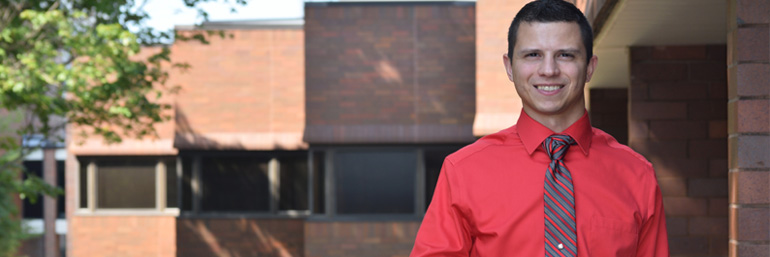Sep 25

From the Navy to NEOMED: Stephen Grossi
Over time, Stephen Grossi has earned the title of brother, husband and father, but it’s the title of physician that the second-year College of Medicine Rural Medical Education (RMED) Pathway student is now working toward.
From a young age, Grossi, the ninth child of 11, knew the military and medicine were part of his future plans. He explains that his godmother, an OB-GYN at Cleveland Clinic, was the person who sparked his interest, while it was Grossi’s pediatrician and orthopedic doctor who solidified his decision to attend medical school.
“I really got to know my orthopedic doctor when he treated me for two broken bones – a broken arm from wrestling in high school and a broken wrist from crashing my bike. He just had a funny demeanor that always got me to smile, like calling me a ‘repeat offender’ when I visited him the second time after breaking my wrist. He made visiting the doctor fun, and my pediatrician did the same,” says Grossi.
Serving our country
Grossi’s decision to join the U.S. Navy didn’t come as easily.
“As a child, I always wanted to do something military-related, but didn’t think it was a long-term goal,” he explains.
Grossi ended up serving on a deployment to Central Asia and a mini-deployment to South America on the USS Dallas, a U.S. Navy submarine that was recently decommissioned. He also served as a naval instructor in Charleston, South Carolina, and Groton, Connecticut, where he taught physics and chemistry for naval nuclear reactors, and others how to drive submarines.
Making the most of medical school
After eight years of serving our country, Grossi is now working to complete what he first set out to do in junior high – earn a M.D. He plans to re-join the military after graduating. Currently, he lends his firsthand experience to the Future Military Physicians student organization, as the group’s vice president.
The Future Military Physicians isn’t the only student organization Grossi carves out time for. He also serves as co-vice president for the American Academy of Family Physicians-Family Medicine Interest Group, treasurer of the Rural Medicine Interest Group and as a member of the Christian Medical Association. Whew!
As if he weren’t already busy enough, Grossi also volunteers as a health coach through the RMED Pathway, a student-centered learning community for medicine students with rural backgrounds and career interests.
Each student is paired with a patient, based on their background, life experiences and personalities, through Alliance Community Hospital. Once the patients are released from the hospital, NEOMED students visit the patients on a bi-weekly basis. During the in-home visits, the medicine students make sure their patient’s prescriptions are up to date, discuss diet and exercise, and encourage the patient to follow their physician’s recommended regimen.
“Being a health coach has been an excellent experience. It’s a chance to connect how things we learned in our first, and now second year of medical school apply to our patients,” Grossi shares.
Grossi was also recently nominated by his peers to be a student coater for the 2018 College of Medicine White Coat Ceremony, held on Monday, Sept. 17.
Keeping up the pace
So how does one balance the rigors of medical school, being a husband and caring for three children while still finding time to remain active in student organizations?
Grossi admits it’s tricky and most definitely a learning process, but it wouldn’t be as manageable without his support network.
“For the most part, it’s about working as a team, not only with my wife and kids, but also with the other students here at NEOMED. I learn from my peers and know who to go to for help, if and when I need it. Not to mention, living with my in-laws has been a major help as well,” says Grossi.
Throughout it all, the second-year College of Medicine student has remained humble.
“I’m continuing to learn and grow through it all. I’m not saying that I don’t fail – I still fail a lot, but at the same time, those experiences are helping me,” he explains.
If there’s one thing he’s learned from his first two years of medical school, it’s to take a mental break every now and then. Not too many, because they can eat away at your time. But, he says, “I try to take a short break every hour when I’m studying to either play pool or take a quick walk around the building. I remind myself not to study all the time.”

